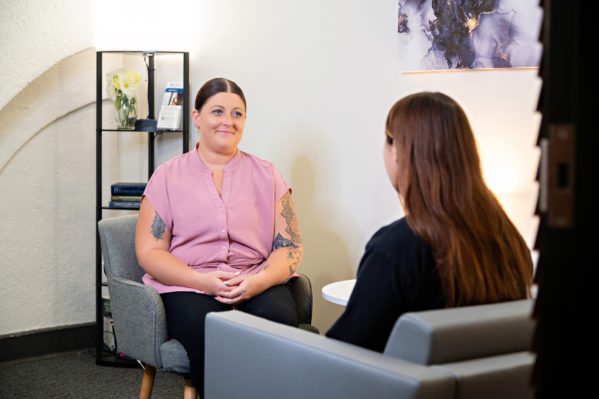Meeting youth with open arms
As child and adolescent behavioral health needs increase, providers rise to the occasion

Traditional Behavioral Health Therapist Brittney Swain, LIMHP, CPC, LADC, sees a patient.
Back-to-school season can be a time for big dreams and fresh starts for the year ahead. It can also be a time when student struggles emerge. Each fall, providers at OneWorld’s School-Based Health Centers catch behavioral health concerns during routine school and sports physicals for children and adolescents.
Fortunately, when such problems come to light, OneWorld’s providers are there to help. Mindee Swanson, DNP, PMHS, APRN, said a recent school physical helped a teenaged student who had been absent for over half of the previous school year, and whose mom was really worried.
“Even though [the student] was here for the sports physical and making sure their heart’s OK, we took time to ask, ‘What was going on last year?’” Swanson said.
After talking with the student and parent, Swanson suspected undiagnosed attention deficit disorder. That conversation allowed Swanson to create a path for additional mental and behavioral screening – and a treatment plan to help the teen return to school.
Mental health is the No. 1 health issue facing adolescents ages 12 to 17, according to parents who responded to the 2021 Child & Adolescent Health Needs Assessment of Omaha metro
area counties. Thirty percent of responses mentioned mental health as the top health issue for this age group. For children ages 11 and under, mental health was mentioned in 12.5% of responses.
In Swanson’s example, a sports physical created opportunity to delve into a student’s repeated absences. In other cases, mental health screenings – routinely included in each physical – detect underlying problems. The screeners look for signs of depression, self-harm and other behavioral health concerns.
Checking in with young people about their behavioral health is critical. Associate Director of Nursing Tania Murrell, BSN, RN, AMB-BC, has noticed a steep incline in adolescent and pediatric mental health issues, particularly in the past few years. While she isn’t sure of the exact reasons for the increase – whether due to the COVID-19 pandemic, screen use or other characteristics of this generation – she does know young people are struggling.
“We’ve just noticed that our kids are more isolated,” Murrell said. “They don’t have those strong relationships with friends, they don’t have those strong relationships with parents. A lot of times they’re technology dependent. And so it becomes really, really hard for them to have coping skills that are healthy.”
OneWorld specifically works to support young people and their unique needs. That’s one reason why OneWorld has worked with Omaha Public Schools (OPS) to establish School-Based Health Centers inside five OPS schools. Medical and behavioral health services at these centers are available to all OPS students, regardless of which school they attend. Pediatric and adolescent health care doesn’t stop there. To reach more students, OneWorld’s Medical Mobile Clinic rotates between Ralston Public Schools, Bellevue, Public Schools and Westside Community Schools and includes behavioral health counseling and other health care. In addition, OneWorld’s two Teen and Young Adult Health Centers provide services for youth up to age 25.
“If I could, if I had my way, every single school would have a School-Based Health Center because it makes that much of an impact to our community when we have the kids right there,” Murrell said.
Among the concerns Murrell shared about young people’s mental health are anxiety, self-harm and thoughts of suicide. Indeed, the Child & Adolescent Health Needs Assessment showed an increase in anxiety diagnoses among metro-area children ages 5-17, from 10.1% in 2015 to 15.7% in 2021. According to the Nebraska Department of Education’s Adolescent Health Report 2023, 25% of girls had considered suicide, compared with 14% of boys; conversely, boys were nearly four times as likely to die by suicide.
Behavioral Health Therapist Kevin Heeb, PLMHP, sees patients at Millard South and West High Schools and at OneWorld Teen and Young Adult Health Center West. He said having appointments at school is good for students and convenient for parents. Millard schools are the first locations where students accessing behavioral health services don’t have to see a medical provider first. The Teen and Young Adult Health Centers work a little differently. At those, Heeb may collaborate with a patient’s other health care providers, like a OneWorld psychiatrist or psychiatric nurse practitioner who prescribes medication.
Still, some young people need an extra level of psychiatric care, some of which is provided through a contracted psychiatrist. Murrell said this service makes a huge impact for children who would not otherwise be able to get the psychiatric care they deserve. She said that while resources are sometimes stretched thin to meet increasing demand, OneWorld’s providers know the community needs their care.
“The one thing about OneWorld that I think we do really well is we’re willing to help anyone,” Heeb said. “It doesn’t matter where they come from, doesn’t matter what language they speak. We have open arms and we’re willing to bring them in, help them, give them support, make them feel like we care. Because we do.”
For Swanson, school physicals season offers an important chance for teens to share problems that may have been hidden under the surface – and begin the process of getting the individualized help they need.
“Just having that five minutes to talk through, what to an adult could look like a simple problem, can make a world of difference,” Swanson said.
At OneWorld, care is for all people – of every age.



